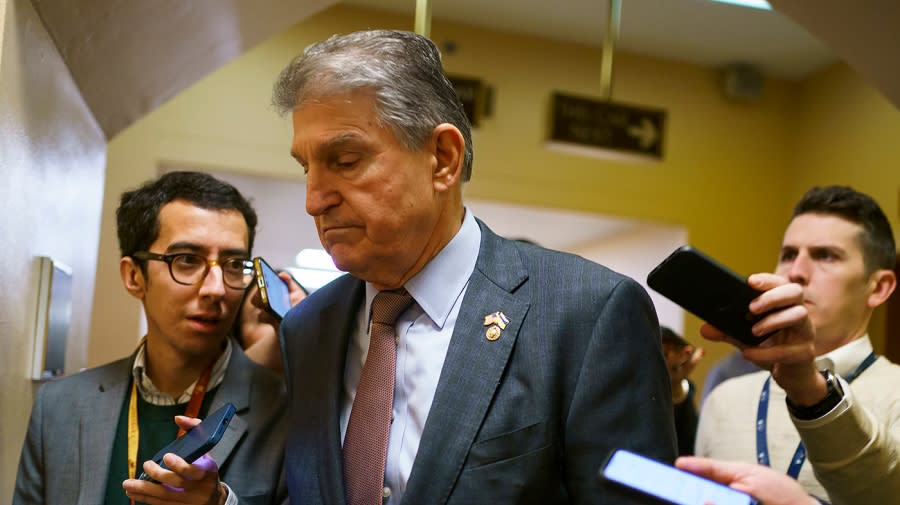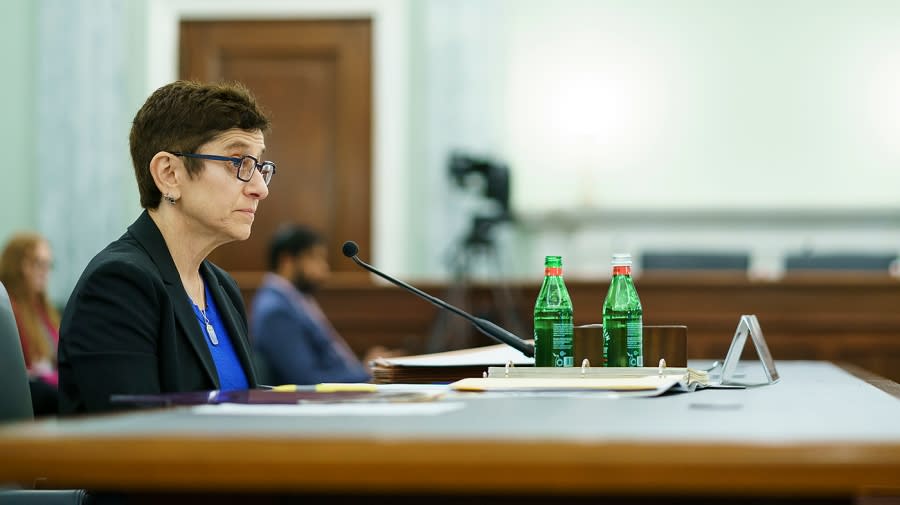Two key Biden nominees cave to GOP pressure campaign: Why it matters
- Oops!Something went wrong.Please try again later.
Two of President Biden’s picks for top administration posts have withdrawn their nominations in the past month, both caving to Republican pressure campaigns while also failing to get enough support from enough moderate Democrats.
Phillip Washington, Biden’s pick to lead the Federal Aviation Administration (FAA), withdrew his nomination this week amid criticism that he doesn’t have enough experience in the area. And earlier this month, Gigi Sohn, Biden’s pick to serve as the top telecommunications regulator for the Federal Communications Commission (FCC), withdrew her name after facing months of controversy.
Both have served as blows to the president, as the FAA has been struggling with high-profile mishaps and the FCC lacks a regulator to help push through Biden’s internet agenda.
The politically charged environment going into the 2024 election cycle, coupled with the Democrats’ narrow majority in the Senate, has also put Biden’s picks under increased pressure.
“The withdrawals, in my view, stem from a combination of factors — a very tight Democratic majority so that almost every vote counts, absences of key Democratic senators due to health, and persistent and effective Republican attacks,” said Anne Joseph O’Connell, a federal bureaucracy expert at the Stanford Law School.
“Withdrawals happen in every administration. These two have meaningful consequences — a continued 2-2 split at the FCC and lack of a confirmed leader at the FAA as safety and other issues plague air transportation,” she added.
Fierce Republican opposition to both Washington and Sohn made their confirmation processes particularly controversial, but Biden also couldn’t afford to lose any decisive votes from his own party. Sens. Kyrsten Sinema (I-Ariz.) and Jon Tester (D-Mont.) had not backed Washington, leading to his withdrawal, and Sohn took her name off the table after Sen. Joe Manchin (D-W. Va.) opposed her nomination.

Sen. Joe Manchin (D-W.Va.) speaks to reporters as he arrives to Capitol for votes regarding nominations on Thursday, March 16, 2023. (Greg Nash)
Sen. Eric Schmitt (R-Mo.) told Fox News on Monday that members of Biden’s own party are “torpedoing his picks” to positions that are “traditionally nonpartisan.” He argued that the two nominees withdrawing their names show that the administration is “out of touch.”
The White House has confirmed more than 800 nominees so far, according to a White House official. But many of them were pushed over the line by a tiebreaking vote, thanks to Vice President Harris, when the chamber was evenly split 50-50 in the past Congress.
“No one bats a thousand with their nominees, though Biden has come close considering the razor-thin majorities he must contend with in the Senate,” said Jim Kessler, executive vice president for policy for the Democratic think tank Third Way.
But the high-profile responsibilities of both the FAA and FCC make these nominees a tough upset for the president, who now is faced with finding new names to fill the roles
Washington said he couldn’t see a “respectful, civil, and viable path forward to Senate confirmation,” in a statement on Monday, adding that he “faced cheap and unfounded partisan attacks and procedural obstruction.”
Washington is the CEO of the Denver International Airport. Republicans scrutinized his aviation experience, as well as his retired military status, prompting pushback over a federal law that says the FAA must be led by a civilian. The Biden administration insisted Washington did not need a military waiver from Congress to serve in that role.

Phillip Washington, who withdrew his name to lead the FAA after being nominated by President Biden, said he “faced cheap and unfounded partisan attacks and procedural obstruction.” (AP Photo/J. Scott Applewhite, File)
“An onslaught of unfounded Republican attacks on Mr. Washington’s service and experience irresponsibly delayed this process, including threatening unnecessary procedural hurdles on the Senate floor,” a White House official said. “And I will add that despite Senate Republicans’ months-long, relentless campaign to sink the nomination of a qualified military veteran, our administration believes that service in uniform is an asset.”
While Washington’s nomination has been in limbo since it was announced in July, the FAA’s issues dealing with an alarming uptick in close calls at U.S. airports — including a national flight grounding in January due to a technical outage — have largely fallen to Transportation Secretary Pete Buttigieg, another favorite target of the GOP.
“FAA needs, they need a confirmed administrator. Period,” White House press secretary Karine Jean-Pierre said on Monday, adding that Washington had the right qualifications and experience for the role.
Kessler blamed Republicans for playing politics with public safety issues through their campaign against Washington.
“Airline safety and reliability are voter concerns, and there’s clearly a GOP effort to take qualified people and caricature them as woke warriors rather than committed public servants,” he said. “Republicans feel that this woke card gives them a winning hand, but it’s bordering on an obsession, and they may be overplaying it. They could be the ones accused of playing politics when it comes to public safety.”
Other political watchers also stressed the importance of having a head of the FAA in place.
“The safe and efficient movement of people, freight and goods is essential to the strength of our national economy and international competitiveness and integral to the responsibilities of the FAA administrator,” said Brian Keeter, a former Transportation Department official under former President George W. Bush and a senior director at APCO Worldwide.
Sohn faced two years of debate over her nomination that eventually led to her withdrawing her name. Biden first nominated her in October 2021 to fill the open seat on the FCC, which currently only has four commissioners with a 2-2 partisan split.
The president needs to fill the seat in order to push forward any Democratic internet proposals, including reinstating Obama-era net neutrality laws, and to take any steps to regulate Big Tech.

Gigi Sohn, nominee for Commissioner of the Federal Communications Commission, faced two years of debate over her nomination that eventually led to her withdrawing her name. (Greg Nash)
Sohn, when she withdrew her nomination, said she faced “unrelenting, dishonest and cruel attacks” that had taken a toll on her. She also blamed the cable and media industry, with help from dark money groups, for torpedoing her nomination.
Republicans had attacked her over her personal political views and past criticism of conservative news outlets like Fox News. She ultimately didn’t get enough votes in the Senate, with her withdrawal coming hours after Manchin said he would oppose voting for her.
Sohn supporters slam Democrats over failure to confirm Biden’s FCC nominee
Other Biden nominees may also be in jeopardy in the future.
Colleen Shogan, the nominee for archivist of the United States, was reported out favorably from committee on March 15, but her nomination is not without controversy. Classified document discoveries from the private residences of former President Trump and former Vice President Mike Pence led to a grilling of Shogan by lawmakers during previous committee hearings. Her nomination has been held up since August.
Several nominees for Defense Department roles are also being held up in the Senate over the Pentagon’s abortion policy, which aims to provide paid time off and travel reimbursement for service members.
Meanwhile, after a two-year battle, the Senate confirmed U.S. Ambassador to India Eric Garcetti on March 15. It took seven Republicans voting to confirm him after his nomination was held up due to questions surrounding his handling of past sexual harassment claims.
To date, 511 of Biden’s nominees have been confirmed by the Senate, and more than 85 are currently being considered, according to a Washington Post tracker. More than 1,200 positions in the executive branch require Senate confirmation.
For the latest news, weather, sports, and streaming video, head to The Hill.

